Where the Forest Ends
Air Date: Week of December 11, 2009
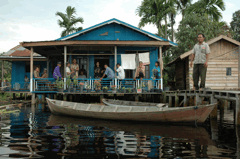
The home of Teluk Kabung resident Maharum bin Ibrahim.
The plantations spreading over Sumatra aren't taking up empty land. Wholesale changes in ecology that come with new plantations can affect nearby rural villages most. Living on Earth's Mitra Taj reports from Teluk Kabung, where the arrival of the pulpwood industry has devastated the cash crop of coconuts and left villagers with little hope for the future. It's not clear whether the new UN scheme to Reduce Emissions from Deforestation and Degradation – or REDD – designed to pay to preserve tropical forests will offer them a lifeline.
Transcript
CURWOOD: It's Living on Earth, I'm Steve Curwood. Many poor rural villagers in Indonesia have never heard of REDD – the UN scheme to Reduce Emissions from Deforestation and Degradation. Yet their livelihoods depend almost entirely on the land or the forest. Living on Earth’s Mitra Taj visited a village in Riau province on the island of Sumatra – and has our report.
[MOTORCYCLE SOUND COMES UP AND UNDER]
TAJ: There’s no road that leads to Teluk Kabung. Getting there means spending half a day in a boat – or three hours on the back of a motorcycle along a rough track.
[SOUND OF MOTORCYCLE HITTING BUMP; DRIVER SAYS, “OOOOO”]
TAJ: Three and a half hours – if it rained the night before.
[DRIVER SPEAKING INDONESIAN: “HUJAN HUJAN, AIR, BAHSA!”]
TAJ: Yus, the motorcycle driver, explains the messy ride in simple words: rain, water, wet!
[MOTORCYCLE ACCELERATES; DRIVER SPEAKING INDONESIAN: “GAMBUT”]
TAJ: “Gambut,” he adds – Indonesian for “peat.” Though it looks like a typical muddy path, what's under the wheels is actually carbon-rich peatland. A good part of peat is already water. Add a night’s rainfall to it, and driving on gambut is like driving on “gado-gado,” a popular Indonesian dish of vegetables covered in peanut sauce.
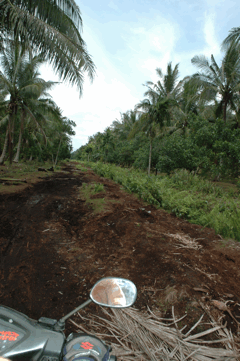
The muddy path into the village of Teluk Kabung.
[BRAKING AND TAKING OFF SOUND]
TAJ: Far from Jakarta, far from even the Riau provincial capital of Pekan Baru, and farther still from the corporate headquarters of pulpwood and oil palm companies; villagers from Teluk Kabung have a hard time getting their concerns heard.
[SQUEAKY SHELLING SOUND]
TAJ: And their biggest concerns have to do with coconuts.
[SHELLING SOUND; YUS SPEAKING INDONESIAN]
VOICEOVER: In our village language this is coconut shelling.
[SHELLING SOUND, BOYS LAUGHING]
TAJ: Teenage boys take whole coconuts – as big as bowling balls – and heave them down onto machetes fixed to poles.
[SHELLING SOUND CONTINUES]
TAJ: After prying out the hairy brown center – the familiar coconut found in supermarkets – they toss aside the husks into piles. Villagers crush the white coconut flesh for oil, which they sell to dealers, who sell it to dealers, who sell it to an oil company.
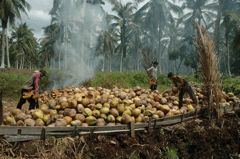
Shelling coconuts.
[WALKING SOUNDS]
TAJ: Coconuts are everywhere in Teluk Kabung. The discarded shells – pressed into the peat – literally pave the narrow footpaths into the village.
[WALKING SOUNDS; RUSTLING]
TAJ: But a few years ago, things changed – the forest surrounding Teluk Kabung’s coconut groves vanished. How much of it?
[VILLAGE MEN SPEAKING INDONESIAN]
VOICEOVER: Oh a lot! Thousands of hectares!
[VILLAGE MAN SPEAKING INDONESIAN]
VOICEOVER: When I was small, everything back there was untouched forest.
[VILLAGE MAN 2 SPEAKING INDONESIAN]
VOICEOVER: As soon as they cut down the trees in the forest, the pests swarmed in, and ate our coconut trees.
TAJ: The villagers blame an acacia supplier for Asia Pulp and Paper, or APP. Together with the multinational paper giant APRIL, APP controls about a quarter of the remaining natural forest in Riau province.
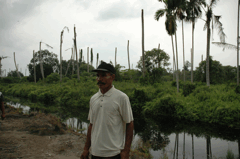
Manata and his devastated coconut grove.
[WALKING ON DRY GROUND]
TAJ: Villagers say when the forest was replaced with pulpwood plantations forest insects began thriving on their cash crop.
[WALKING SOUND; A MAN COUGHS]
TAJ: Manata is tall and strong, and leads the way to the communal coconut farm he manages just off the river.
[MANATA SPEAKING INDONESIAN]
VOICEOVER: These are our problems; this is the problem here.
TAJ: The landscape is surreal – dozens of coconut trees lie dried up on the ground. And half of those towering above have nothing on top – no palm fronds, no fruits. Just tilting trunks.
TAJ: Can we see any of the pests here?
[RUSTLING SOUND; MANATA SPEAKING INDONESIAN]
MANATA: Here’s one.
[GASP]
TAJ: Manata pulls a big black beetle from the leaves of a fallen tree – already being devoured by red ants.
[FAINT SOUND OF BOAT MOTOR; FOREST ANIMALS]
TAJ: In Indonesian peatlands, making money usually starts with draining the water out of peat. And not just for big pulpwood and oil palm plantations.
[WATER SPLASHING]
TAJ: Manata says without the drainage canal he dug here at the edge of his plantation, coconuts – or any other crop – won’t grow.
[MANATA SPEAKING INDONESIAN]
VOICEOVER: First we dug the canals, then we cleared the forest – we cut down the trees and burned everything – then we planted the coconut trees, pulling up the weeds every three months, and after seven years they were finally ready to harvest. And in 2007 we lost everything.
TAJ: Without much coconut oil to sell, there’s hunger here. Villagers can only afford to buy a tenth of the rice they used to.
[MANATA SPEAKING INDONESIAN]
VOICEOVER: It makes me want to cry the only reason I’m not crying is because I’m holding back. We have nothing else. Sometimes I can’t even look at this land, because I have no hope. I can’t compare what it’s like seeing this to anything else.
[WATER SPLASHING; BOAT STARTS UP, TAKES OFF]
TAJ: Manata steers a wooden outboard down his canal toward Gaung River, cutting through water brown from the tannins in the peat.
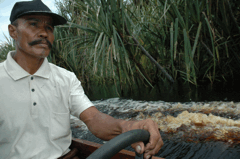
Manata steers a boat through brown, peaty water.
[BOAT MOTOR FADES; PEOPLE IN BACKGROUND SHOUTING]
TAJ: Tonight the canal leaders gather at Maharum bin Ibrahim’s house. He’s the leader of the canal leaders.
[CUTTING AND SPILLING SOUND]
TAJ: Yus, the motorcycle driver, splits young coconuts with a machete.
[GLASSES SET ON FLOOR; POURING SOUND]
TAJ: And pours a round of fresh coconut water, as Maharum begins the discussion.
[POURING SOUND; MAHARUM SPEAKING INDONESIAN]
VOICEOVER: We’re having this meeting right now to try to find a solution from the government or from the company. We've sent letters to parliament, the regent, the governor, but we haven't had any response.
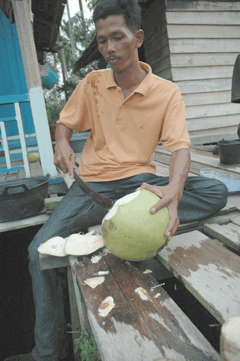
Yus prepares a round of coconut water.
TAJ: Maharum says villagers want compensation for the dead trees, and help buying pesticides to stop the plague. And they have an even longer-term worry.
[MANATA SPEAKING INDONESIAN]
VOICEOVER: We have no land left for the next generation. The land has been taken by the company. None of it is owned by the community anymore.
TAJ: In Indonesia, the size of a village’s farmland is only limited by how much work its members can put into clearing new forest to plant crops. But hard work isn’t a land title. And every year the Forestry Ministry leases out huge tracts of land to forest industries – land that might include villages, millions of tons of carbon, or habitat for endangered species. And it’s up to the companies that win the concessions to balance their own interests with everything else. Out here, threats to the environment and biodiversity translate into threats to people’s survival.
[MAHARUM SPEAKING INDONESIAN]
VOICEOVER: Ever since the company came in and cut down the trees, more and more people have been hearing the tiger, lurking in the village.
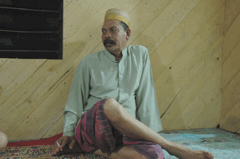
Maharum leads a discussion in his house.
[SUPARMI SPEAKING INDONESIAN]
VOICEOVER: Here it’s very hard to find a job near your home – it’s impossible, you have to find a job somewhere else.
TAJ: 25-year-old Suparmi shares his story of being attacked by a tiger just last March:
[SUPARMI SPEAKING INDONESIAN]
VOICEOVER: Once my friends offered my brother and I some work in the forest, cutting down trees and making wood boards out of them. We were there working two weeks, and one night – we didn’t know what was going on – all of a sudden my brother was screaming. It seems he had been dragged by the foot and some of his toes were missing. I stepped outside to look around with a flashlight, and the next thing I knew it had attacked the back of my head. My friend was pulling my feet and the tiger was pulling my head and the next thing I remember were people wrapping my head with cloth.
We all left – while we were in the boat we could sense the tiger following us, walking along the riverbank. For months, my brother and I couldn't even leave the house, not even to go to the toilet. We felt like it was after us.
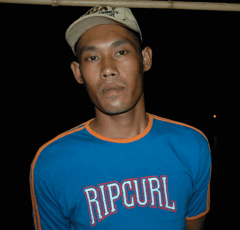
Suparmi was attacked by a Sumatran tiger at a logging camp in the forest.
Plus, people in the village kept saying they heard weird sounds at night – tiger sounds. The way I see it, the attack – it’s just a tragedy. We don’t understand it; we just accept it. Maybe it was a punishment from God for doing something bad.
[IMAM SINGS MORNING CALL TO PRAYER]
TAJ: Just before dawn, the village imam, Yamin, calls the faithful to prayer from the small wooden mosque by the river.
[IMAM CONTINUES TO SING PRAYER]
TAJ: A handful of Teluk Kabung worshippers find their way through the mud and darkness with small flashlights.
[WATER SOUND]
TAJ: They perform “wudu,” or ritual washing at a small pool in front of the mosque. After the morning prayer, Yamin reflects on the changes taking place in his village:
[IMAM SPEAKING INDONESIAN]
VOICEOVER: Destiny is like a wheel, it turns and sometimes that means we’re on top, sometimes we’re on the bottom, sometimes we’re happy, sometimes we’re sad. We must take it all as God’s will.
TAJ: If the fortunes of Teluk Kabung do turn around, it might be another palm tree that leads to better times.
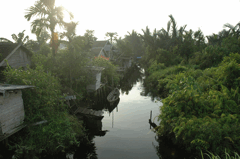
The sun rises over Teluk Kabung
[BIRD SINGS]
TAJ: The villagers have never heard of any proposal to make a living by not exploiting the land. But they say they welcome anything that will give them a say in their future.
[ROOSTER CALLS; CRICKETS CHIRP; MEN CHANTING PRAYER; MOTORBOAT PASSES IN THE DISTANCE]
CURWOOD: That was Living on Earth’s Mitra Taj reporting from the village of Teluk Kabung, in Riau province, Indonesia. The villagers asked Mitra to see if the company APP could help them. That's the paper company whose business partner cut the trees nearby. So, team member, Ingrid Lobet, went to visit the APP offices in Jakarta.
[CARS PASSING, HONKING, BRAKING]
LOBET: Jakarta is the Indonesian capital and center of power. With its choking traffic, is a long way from the rural life of Teluk Kabung.
GREENBURY: My name is Aida Greenbury. I’m the director of sustainability and stakeholder engagement of Asia Pulp and Paper in Indonesia. Yes of course, we are always interested to help the community who live in our operation and surrounding our operations.
LOBET: Aida Greenbury said insects sometimes do attack after forests are cut.
GREENBURY: We are facing the similar situation with other pest and disease in pulpwood plantations. It is true. That's why we always make sure we have a natural forest corridors. Because natural forest corridors, in addition to providing habitat for the flora and fauna, it’s also actually stop the pest and disease outbreaks, including beetles. So I agree with you; it is one of the risks of development of plantations.
LOBET: And the villagers’ concern about not having enough forest for the future is not unique to Teluk Kabung either. Almost everywhere you go in Indonesia, you hear stories of officials giving out licenses for plantations in forests that local people consider theirs. Authorities also grant licenses on deep peat lands, even though by presidential decree, that's forbidden. At Forest Ministry headquarters in Jakarta, a stuffed tiger poses fiercely in one corner of the office of Daruri. He's director general for forest protection. Daruri says he and his colleagues haven't thought much about peat, because plantations mean revenue and jobs.
[DARURI SPEAKING INDONESIAN]
VOICEOVER: In Indonesia, there are 40 million people who live around forests, ten million of them live in poverty and need job opportunities. With industrial forests, people are employed, and it earns government revenue. We need to grow, and the country earns a lot of money from the forests. So if we’re not allowed to log and cut down forests, then how can we build? The outside world can’t just tell us to take care of the forests and not compensate us.
LOBET: But concern for peat lands and carbon is seeping into government here, and Joe Leitmann, environment coordinator at the World Bank, in Jakarta, says the UN R-E-D-D, or REDD money, will accelerate this shift.
LEITMANN: We have been looking for an opportunity like this for decades. In the 1990s, the big hope was that people’s concern about biodiversity would lead to better forest management. That was never enough to turn the game around. We think that with R-E-D-D it’s a potential game changer.
LOBET: Agus Purnomo thinks so, too. Indonesia has a national climate change agency now, and he's the chief. We caught up with Purnomo at a climate meeting in Bangkok. He pointed out that much of the remaining forest in Indonesia could be lost in the single term of an elected official.
PURNOMO: If R-E-D-D going to take seven to eight years to produce revenues – forget about it! No elected official will be interested. Now, are they bad people? No, they are not bad. But they have to make the most of the terms, and if there is no money going to come in until seven years from now, why should they worry about it?
LOBET: That's why Indonesia's climate change chief believes it must become profitable to save forest without delay.
PURNOMO: There are opportunities in a lifetime. Indonesia has the opportunity to change the way it manages forest, to change the paradigms of Indonesia’s development, to include climate change.
[SOUNDS OF CRICKETS CHIRPING; A GENERATOR RUNNING; YUSUF SPEAKING INDONESIAN]
VOICEOVER: My name is Yusuf; I am an Adat or traditional leader here.
LOBET: Back on the Kampar peninsula, Yusuf's traditional village lands lie within an area where the paper company APRIL plans to cut forest, plant acacia, and get credit for protecting peat in the center of the peninsula. Yusuf worries that the forest nearby will disappear.
[YUSUF SPEAKING INDONESIAN]
VOICEOVER: In that forest, there are rivers where we find our fish. We go into the forest to hunt, and find remedies when people get sick. We cut rattan here, and we take Pandan leaves for weaving. The forest itself is very meaningful to our lives; our lives are made of wood and we would not want to lose it.
LOBET: This is forest APRIL views as quite degraded – a safe candidate for a new plantation. But to Yusuf, it's still full of life.
[YUSUF SPEAKING INDONESIAN]
VOICEOVER: Not only humans are there, pigs and tigers and birds depend on it too, and fruits, where will they find them? There are hundreds of monkeys, if the trees are gone, where will they eat? So we feel bad for all the living beings in the forest, because they need food, too.
LOBET: Though carbon financing may protect the remaining forest, it's far from clear how the new money will help villagers like Yusuf. Help them not to burn or drain their forest, help them get legal title to their land, help them put more rice on the table.
With Mitra Taj, I'm Ingrid Lobet in Indonesia for Living On Earth.
Links
NGO coalition on deforestation in Riau, Eyes on the Forest
For more on WWF's work on human-tiger conflict, click here.
Living on Earth wants to hear from you!
Living on Earth
62 Calef Highway, Suite 212
Lee, NH 03861
Telephone: 617-287-4121
E-mail: comments@loe.org
Newsletter [Click here]
Donate to Living on Earth!
Living on Earth is an independent media program and relies entirely on contributions from listeners and institutions supporting public service. Please donate now to preserve an independent environmental voice.
NewsletterLiving on Earth offers a weekly delivery of the show's rundown to your mailbox. Sign up for our newsletter today!
 Sailors For The Sea: Be the change you want to sea.
Sailors For The Sea: Be the change you want to sea.
 The Grantham Foundation for the Protection of the Environment: Committed to protecting and improving the health of the global environment.
The Grantham Foundation for the Protection of the Environment: Committed to protecting and improving the health of the global environment.
 Contribute to Living on Earth and receive, as our gift to you, an archival print of one of Mark Seth Lender's extraordinary wildlife photographs. Follow the link to see Mark's current collection of photographs.
Contribute to Living on Earth and receive, as our gift to you, an archival print of one of Mark Seth Lender's extraordinary wildlife photographs. Follow the link to see Mark's current collection of photographs.
 Buy a signed copy of Mark Seth Lender's book Smeagull the Seagull & support Living on Earth
Buy a signed copy of Mark Seth Lender's book Smeagull the Seagull & support Living on Earth

